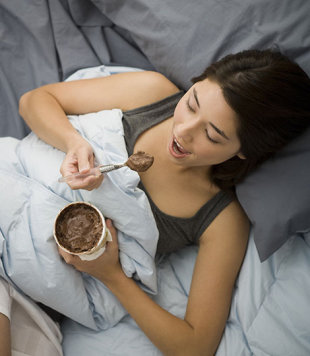 What not to eat before bedtime
What not to eat before bedtime
Experts offer tips to ensure that your diet's not leading to sleepless nights.
1. Spicy food
Think twice before having chicken vindaloo for dinner. Eating a big, highly seasoned meal close to bedtime can interfere with your shut-eye. "It's not that the spice interrupts your sleep," says Mark Mahowald, professor of neurology at the University of Minnesota Medical School. "The spice causes heartburn, and that interrupts your sleep." Fiery foods can lead to indigestion and reflux, and, as a result, to "sleep fragmentation," says Lisa Medalie, a behavioral sleep medicine specialist at the University of Chicago. She recommends eating heavy or spicy foods at least three hours before bedtime.
Think twice before having chicken vindaloo for dinner. Eating a big, highly seasoned meal close to bedtime can interfere with your shut-eye. "It's not that the spice interrupts your sleep," says Mark Mahowald, professor of neurology at the University of Minnesota Medical School. "The spice causes heartburn, and that interrupts your sleep." Fiery foods can lead to indigestion and reflux, and, as a result, to "sleep fragmentation," says Lisa Medalie, a behavioral sleep medicine specialist at the University of Chicago. She recommends eating heavy or spicy foods at least three hours before bedtime.
2. Chocolate or other caffeine-filled food
Your body can take up to 5 hours to get caffeine out of your system. And if you're susceptible to feeling jittery, skipping the afternoon latte might not cut it. "Several studies have shown that 30 milligrams of caffeine - about the amount of caffeine in a candy bar - can have alerting effects and disruptive effects on sleep," says Timothy Roehrs, director of research at the Sleep Disorders and Research Center of the Henry Ford Health Center. Watch out for sneaky caffeine hiding spots like chocolate-covered espresso beans and chocolate cake. "If you take a small slice or have a couple bites, that probably will not affect sleep," says Phyllis Zee, MD, associate director of the Center for Sleep & Circadian Biology and professor at Northwestern University Feinberg School of Medicine. "But if you already have insomnia, I would avoid eating anything late or anything that contains caffeine."
Your body can take up to 5 hours to get caffeine out of your system. And if you're susceptible to feeling jittery, skipping the afternoon latte might not cut it. "Several studies have shown that 30 milligrams of caffeine - about the amount of caffeine in a candy bar - can have alerting effects and disruptive effects on sleep," says Timothy Roehrs, director of research at the Sleep Disorders and Research Center of the Henry Ford Health Center. Watch out for sneaky caffeine hiding spots like chocolate-covered espresso beans and chocolate cake. "If you take a small slice or have a couple bites, that probably will not affect sleep," says Phyllis Zee, MD, associate director of the Center for Sleep & Circadian Biology and professor at Northwestern University Feinberg School of Medicine. "But if you already have insomnia, I would avoid eating anything late or anything that contains caffeine."
Related: Find More Time Every Day
3. Alcohol Go easy on the wine at dinner, if you're one to toss and turn at night. Alcohol is a depressant, which makes you drowsy, but then its effect reverses. "Alcohol has two effects," explains Jerry Siegel, professor of psychiatry and director of the Center for Sleep Research at UCLA. "One is to put you to sleep, and the other is to wake you up three or four hours later." Alcohol also reduces the amount of REM rest (the final stage in the sleep cycle). "It just doesn't provide a good substitute for natural sleep. Often people wake up less refreshed," says Clete Kushida, medical director of theStanford Sleep Medicine Center.
4. Water Sure, staying hydrated is healthy. But drink up throughout the day and don't guzzle water at night. Lay off drinks 60 to 90 minutes before shut-eye. "Give [the body] enough time to void that fluid before bed," says Zee.
5. Giant meals
Your body is not prepared to digest heavy meals or decadent desserts right before bedtime. Not to mention that staying up late, noshing on goodies, may disrupt your normal circadian rhythm, says Roehrs.
Your body is not prepared to digest heavy meals or decadent desserts right before bedtime. Not to mention that staying up late, noshing on goodies, may disrupt your normal circadian rhythm, says Roehrs.
6. Nothing
On the flip side, don't go to bed famished, either. "Starvation or excessive hunger causes sleeplessness and increased activity," says Ruth M. Benca, MD, PhD, director of the Center for Sleep Medicine and Sleep Research at the University of Wisconsin at Madison. "If there's a general rule of thumb, being too hungry makes it difficult to sleep and eating a lot of food makes it difficult to sleep." If hunger strikes after dinner, try a small snack, such as a mini pack of almonds, an hour before bedtime, says Zee.
On the flip side, don't go to bed famished, either. "Starvation or excessive hunger causes sleeplessness and increased activity," says Ruth M. Benca, MD, PhD, director of the Center for Sleep Medicine and Sleep Research at the University of Wisconsin at Madison. "If there's a general rule of thumb, being too hungry makes it difficult to sleep and eating a lot of food makes it difficult to sleep." If hunger strikes after dinner, try a small snack, such as a mini pack of almonds, an hour before bedtime, says Zee.
-By Karen Springen
